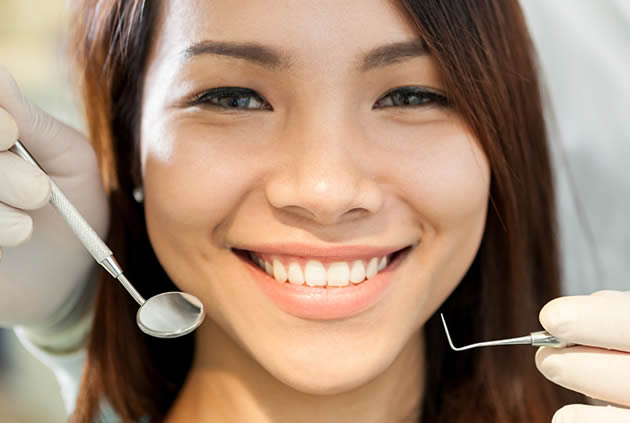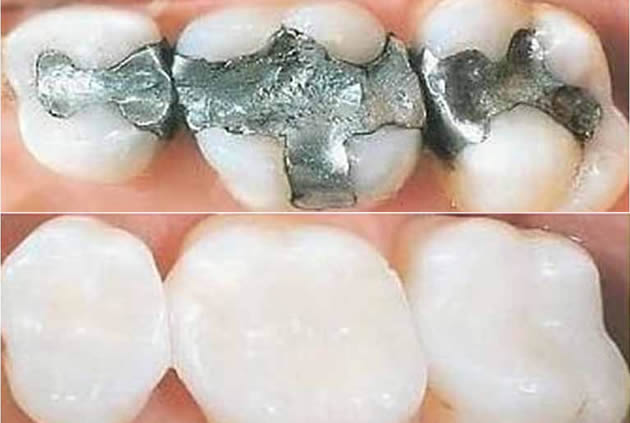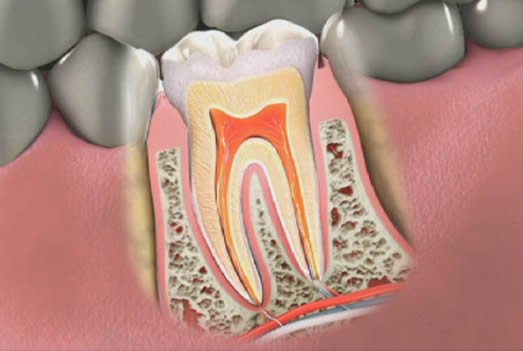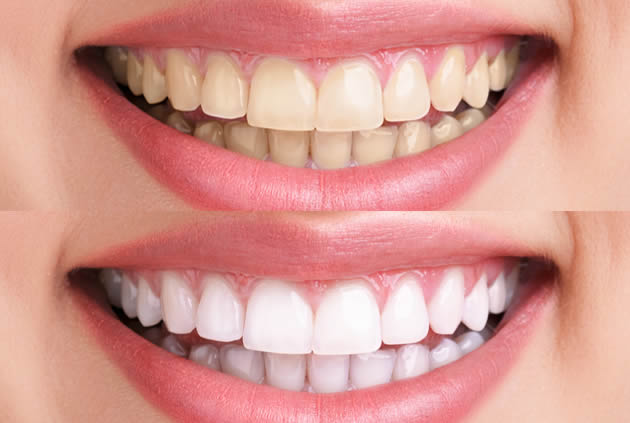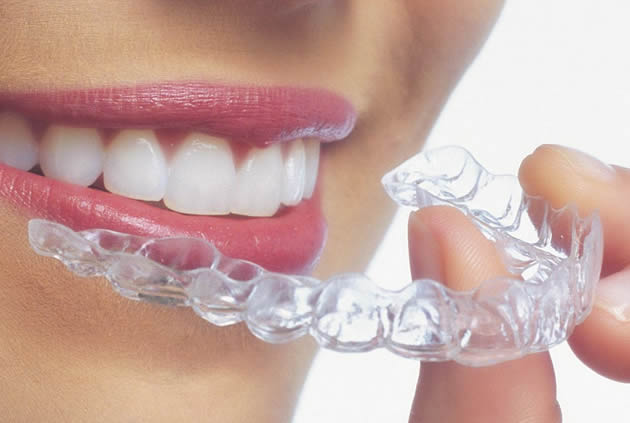
There is no quicker or easier way to dramatically improve the look of your smile than professional teeth whitening. Your dentist probably offers several whitening options and can advise you about the most appropriate type of whitening treatment to ensure your brightest, whitest smile. No matter which whitening treatment you and your dentist decide will be best, there are several tips you can follow to help you achieve the ideal result:
- Have any existing dental problems treated prior to whitening to avoid side effects or complications.
- Schedule a professional teeth cleaning prior to your whitening appointment to remove buildup of plaque or tartar you cannot remove with home cleaning, and provide the best surface for the whitening treatment.
- Begin brushing with a desensitizing toothpaste several weeks before whitening to limit the sensitivity that can sometimes result from whitening agents.
- If you are extremely prone to dental sensitivity, check with your dentist about taking a painkilling medication before your whitening appointment.
- Consult with your dental office to determine how much time you should allow for your whitening appointment.
- Refrain from eating or drinking anything except water for at least one hour after the completion of your whitening treatment, and avoid ingesting foods and beverages that contain stain-causing agents for no less than 24 hours.
- Make sure to attend any follow-up appointments with your dentist.
- Maintain excellent home oral care habits to extend the life of your whitening procedure.
By following these tips, you can boost the results of your professional teeth whitening treatment and face the world with beautiful, bright smile!
We look forward to seeing you in our Baltimore dental office
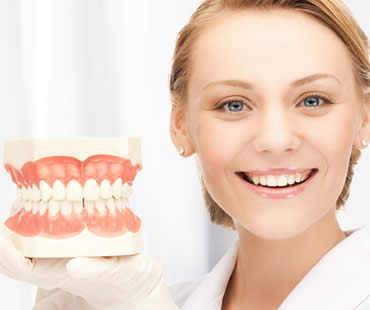
Getting back your ability to smile and eat with a complete set of teeth is one of the great benefits of dentures. To prevent infections, sores, or further tooth damage, it is important to maintain dentures properly. Here are some ways that dentists advise to keep your dentures in great condition.
Cleaning
Rinse your dentures well after meals to remove food particles and avoid stains. Brush them daily with a soft toothbrush to remove plaque and deposits. Use a mild soap or product that your dentist recommends, but avoid harsh toothpaste or strong cleaners.
Soaking
Soak your dentures in water or cleaning solution when you are not wearing them, especially overnight. This helps keeps them from drying out or becoming misshapen. Do not use hot water.
Rinsing
If you use a cleaning solution, rinse your dentures well before putting them back in your mouth. Avoid swallowing denture cleaning solution because it can cause stomach upset.
Handling
Handle your dentures very carefully so that you don’t drop them or bend them. Clean them over a basin filled with water, so that if they fall they shouldn’t be damaged.
Visiting your dentist
Maintain regular checkups with your dentist to get both your mouth and your dentures examined. Most dentists recommend visits every six month for ideal results. See your dentist sooner if your dentures are not fitting well, are causing irritation, or have become loose.
We look forward to seeing you in our Baltimore dental office

Your family dentist knows that your child’s pacifier serves an important purpose. It soothes and comforts your child during difficult or stressful events. During the time of infancy, pacifiers are common and valued. Extended use of the pacifier during the development of the teeth, however, can lead to unwanted changes to your toddler’s mouth.
Sucking too hard on a pacifier, just like sucking too long on fingers or a thumb, can have serious consequences to a child’s teeth and even to the shape of the child’s face. Your family dentist will tell you that you should take away your child’s pacifier by the age of two years, preferably by the end of the first year. Failure to stop the use of a pacifier can lead to extended orthodontic care in the future.
Your family dentist can show you research that indicates that pacifier use beyond the second year is linked with crossbites, open bites, misaligned bites, a narrowed jaw, tongue thrust and malformed palate. It is also associated with an increased risk of a middle ear infection.
If your infant is using a pacifier, follow these guidelines:
- Clean the pacifiers regularly and properly to prevent bacterial growth.
- Discard and replace pacifiers that exhibit any signs of discoloration or cracking.
- Clean any new pacifiers prior to giving them to your baby.
- Make pacifiers available only during specific times, such as at naptime or bedtime.
- Purchase pacifiers specifically recommended by orthodontists for minimal damage to the mouth.
- Never allow your baby to “wear” the pacifier by tying it around his or her neck. This is dangerous. Pacifier clips can allow you to clip the pacifier to your baby’s clothing with a short, safe length of material.
Your family dentist will have important tips for you when you begin to wean your child away from pacifiers. Don’t let this habit extend beyond being useful to becoming harmful.
We treat patients from Baltimore and the surrounding area

Due to the increased interest in cosmetic dentistry, many family dentists are becoming trained to offer more extensive procedures and treatments geared to improve the appearance of your smile. Many of these treatments are quick and painless, and can offer almost instant results. Some of the cosmetic dentistry options offered by your family dentist may include:
- Professional teeth whitening to improve the color and brightness of dark, dingy, or discolored teeth
- Placement of dental veneers to improve the look of gapped, stained, or crooked teeth
- Replacement of old or unattractive metal fillings with more natural, tooth-colored materials
- Placement of crowns and bridges to repair and replace missing or severely damaged teeth
- Correction of small spaces or gaps between teeth by bonding with tooth-colored composite resin
- Insertion of dental implants to replace missing teeth
- Straightening of teeth and correction of bite problems with braces or Invisalign
Because your family dentist is already aware of your family’s dental history, it will be simple to recommend treatment plans. With this knowledge, your dentist can also quickly and expertly assess if you or other members of your family are suitable candidates for the procedures you are seeking. Your family dentist can perform all the same services as both a pediatric dentist and a general dentist, and will be able to address the cosmetic dental concerns of every member of your family. Family dentists can provide advice as to which procedures are age appropriate and give guidelines for when treatment is recommended.
If anyone in your family is not pleased with the appearance of their teeth, consult first with your family dentist to find out what cosmetic dental procedures and treatments are offered to improve the quality of their smile.
We look forward to seeing you in our Baltimore dental office

You might have the idea that visiting the dentist isn’t that important in the overall picture of your health, but you’re wrong. Establishing a relationship with a good dentist is key to being healthy, and seeking treatment from a family dentist is a great way to spread that good health throughout your whole family.
Family dentists provide treatment for all ages. Dentists suggest that kids should begin visiting the dentist around their first birthday so that they can become adjusted to the environment and learn about proper hygiene. It’s helpful for little ones to go to the same dentist from the start, as they become comfortable with the staff and office. In theory, kids are able to go to the same family dentist their whole lives!
Adults, teenagers, and seniors are all able to visit the family dentist as well. These professionals are trained and experienced in handling dental conditions throughout all age ranges, from filling cavities common in the younger crowds to cosmetic treatments for the middle-aged to dental implants or gum disease in older adults. One dentist and one convenient location makes it easy on the whole family.
Dentists suggest getting checkups every six months for optimum oral health. That way examinations can catch and treat problems early, before they have a chance to worsen into serious issues. Professional cleanings keep your teeth healthy and looking great. Regular checkups can also improve your overall health, as studies show there’s a strong link between gum disease and issues like heart disease, diabetes, or stroke. Expectant mothers are also at higher risk of complications if they have gum disease. Oral cancer is another thing family dentists watch for during checkups. Chances of recovery are greatly increased when oral cancer is detected early.
The importance of having a family dentist cannot be downplayed. The smiles and the health of every member of your family will benefit.
We treat patients from Baltimore and the surrounding area

You may be diligent about keeping up with your yearly physical with your general physician, but you may not be as careful about seeing your family dentist as often as you should. People tend to neglect dental checkups, thinking that if their teeth aren’t hurting then there’s no reason to go to the dentist. This is untrue! Regular checkups and cleanings play an important role in your health and should not be overlooked.
The most obvious reason for every member of your family to go to your dentist is the potential medical benefits. Even if you perform proper oral hygiene routines at home, you can still develop medical problems that require intervention. Plaque and decay in hard-to-reach places may create cavities that need fillings. Gum disease can start off as minor gingivitis but worsen into advanced periodontal disease without treatment, and untreated gum disease might put you at higher risk for heart disease or diabetes. A tooth’s interior section called the pulp can become infected and die, eventually risking tooth loss. So skipping your regular dental examinations can have serious medical consequences.
In addition to protecting your health, family dentists keep your smile looking its best. Professional cleanings make your teeth brighter and healthier, and you’ll also likely end up with more self-confidence. At your dental visits, if you have concerns about the appearance of your smile, you can also get information and recommendations about cosmetic dental procedures that might improve your smile even more.
Another benefit of maintaining regular dental checkups is that it can cost you less money in the long run. If you think skipping a visit is financially smart, you’ll also be missing the opportunity to catch problems early and handle them before they reach the stage of expensive oral procedures.
It’s never the best idea to avoid dental care with your family dentist. Schedule and keep your appointments every six months for ideal oral health.
We treat patients from Baltimore and the surrounding area












